新目标英语八年级 (上)重点、考点归纳总结
人教版新目标八年级英语上册各单元重点单词和短语梳理归纳
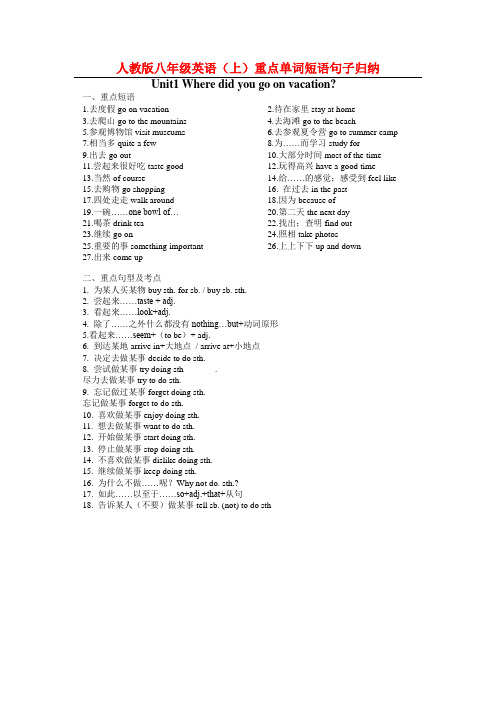
人教版八年级英语(上)重点单词短语句子归纳Unit1 Where did you go on vacation?一、重点短语1.去度假go on vacation2.待在家里stay at home3.去爬山go to the mountains4.去海滩go to the beach5.参观博物馆visit museums6.去参观夏令营go to summer camp7.相当多quite a few8.为……而学习study for9.出去go out 10.大部分时间most of the time 11.尝起来很好吃taste good 12.玩得高兴have a good time13.当然of course 14.给……的感觉;感受到feel like 15.去购物go shopping 16. 在过去in the past17.四处走走walk around 18.因为because of19.一碗……one bowl of… 20.第二天the next day21.喝茶drink tea 22.找出;查明find out23.继续go on 24.照相take photos25.重要的事something important 26.上上下下up and down27.出来come up二、重点句型及考点1. 为某人买某物buy sth. for sb. / buy sb. sth.2. 尝起来……taste + adj.3. 看起来……look+adj.4. 除了……之外什么都没有nothing…but+动词原形5.看起来……seem+(to be)+ adj.6. 到达某地arrive in+大地点/ arrive at+小地点7. 决定去做某事decide to do sth.8. 尝试做某事try doing sth .尽力去做某事try to do sth.9. 忘记做过某事forget doing sth.忘记做某事forget to do sth.10. 喜欢做某事enjoy doing sth.11. 想去做某事want to do sth.12. 开始做某事start doing sth.13. 停止做某事stop doing sth.14. 不喜欢做某事dislike doing sth.15. 继续做某事keep doing sth.16. 为什么不做……呢?Why not do. sth.?17. 如此……以至于……so+adj.+that+从句18. 告诉某人(不要)做某事tell sb. (not) to do sthUnit 2 How often do you exercise?一、根据汉语写短语。
8年级上英语语法重点和知识点归纳精讲
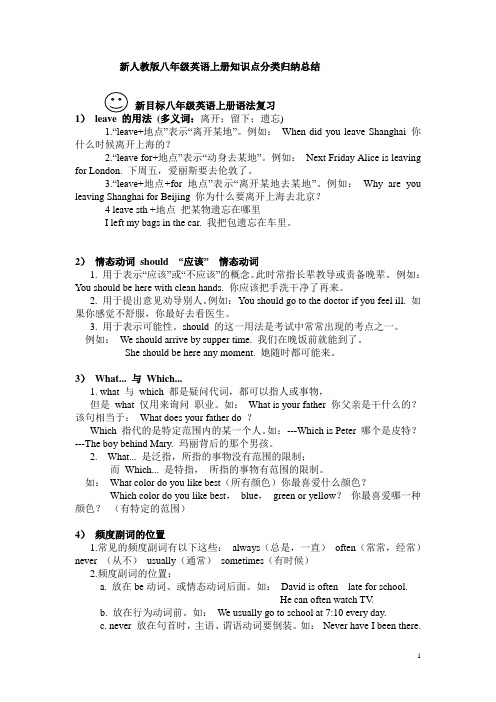
新人教版八年级英语上册知识点分类归纳总结新目标八年级英语上册语法复习1)(多义词:离开;留下;遗忘)1.“leave+地点”表示“离开某地”。
例如:When did you leave Shanghai 你什么时候离开上海的?2.“leave for+地点”表示“动身去某地”。
例如:Next Friday Alice is leaving for London. 下周五,爱丽斯要去伦敦了。
3.“leave+地点+for地点”表示“离开某地去某地”。
例如:Why are you leaving Shanghai for Beijing 你为什么要离开上海去北京?4 leave sth +地点把某物遗忘在哪里I left my bags in the car. 我把包遗忘在车里。
2)情态动词should “应该” 情态动词1. 用于表示“应该”或“不应该”的概念。
此时常指长辈教导或责备晚辈。
例如:You should be here with clean hands. 你应该把手洗干净了再来。
2. 用于提出意见劝导别人。
例如:You should go to the doctor if you feel ill. 如果你感觉不舒服,你最好去看医生。
3. 用于表示可能性。
should 的这一用法是考试中常常出现的考点之一。
例如:We should arrive by supper time. 我们在晚饭前就能到了。
She should be here any moment. 她随时都可能来。
3)What... 与Which...1. what 与which 都是疑问代词,都可以指人或事物,但是what 仅用来询问职业。
如:What is your father 你父亲是干什么的?该句相当于:What does your father do ?Which 指代的是特定范围内的某一个人。
如:---Which is Peter 哪个是皮特?---The boy behind Mary. 玛丽背后的那个男孩。
人教版新目标八年级英语上册1、2、3、4单元知识点总结材料

新目标八年级英语上册第一单元Unit 1.How often do you exercise?I. 重点短语归纳:on weekends 在周末1. go to the movies 去看电影2. look after=take care of 照顾、照看3. surf the internet 上网4. healthy lifestyle 健康的生活方式5. go skateboarding 去滑滑板watch TV看电视6. keep healthy=stay healthy = keep in good health 保持健康keep + 形容词表保持某种状态do some reading 阅读7. exercise= take/do (much) exercise=do sports锻炼8. eating habits 饮食习惯9. take more exercise 做更多的运动10. the same as 与什么相同11. once a month一月一次12. be different from 不同13. twice a week一周两次.three times a week一周三次14. make a difference to 对什么有影响As teachers, you must believe that you can make a difference to the li ves of your students. 身为教师,你们必须坚信你们能够影响学生的一生。
A false step will make a great difference to my future.错走一步对我的前程来说会产生很大影响。
15.how often 多久一次,询问动作发生的频率一般用once a week ,twice a month ,every day ,sometimes等回答。
初中英语人教新目标八年级上册Unit 6重点知识(重点语块+词形变换+重点句子)

八年级英语上册Unit 6重点知识Section A【重点语块】1.grow up长大;成熟;成长2.practice doing sth.练习做某事3.go to university/college 去上大学4.study math really hard 努力学习数学5.be good at...擅长于……6.a famous writer一位著名的作家7.keep on doing sth.继续做某事8.of course当然9.be sure about确信;对……有把握10.make sure确保;查明11.try one's best尽某人最大的努力12.move to...搬到……13.take acting lessons上表演课14. a race car driver一名赛车手15. send sb. sth./ send sth.to sb.寄给某人某物;寄某物给某人16.want sb. to do sth.想要某人做某事17. become an engineer成为一名工程师18.go to a cooking school去烹饪学校19. study medicine at a university在一所大学学医20.write articles写文章21. send them to magazines and newspapers把它们寄到杂志社和报社22. computer programmer编程人员23. see a doctor看医生24.get an education受教育25. a successful pilot一名成功的飞行员【词形变换】1. program n.程序;节目 v.编写程序→programmer n.程序员2.cook n.厨师v.烹饪→ cooker n.炊具3.violinist n.小提琴手→ violin n.小提琴4.pianist n.钢琴家→ piano n.钢琴5. scientist n.科学家→ science n. 科学→scientific adj.科学的cation n.教育→ educate v.教育→educational adj.有教育意义的→educated adj.受过教育的;有教养的→educator n.教育家;教育工作者7.worry v.担心;担忧→ worried adj.焦虑的;担心的→ worrying adj.令人担忧的;令人发愁的8.medicine n.药;医学→medical adj.医学的9.send v.邮寄;发送→sent (过去式)10.drive v.驾驶;开车→ driver n.驾驶员;司机【重点句子】1.—What do you want to be when you grow up ?1一I want to be an engineer.—你长大后想当什么?—我想当一名工程师。
新目标八年级英语上册知识点总结-新目标[整理]
![新目标八年级英语上册知识点总结-新目标[整理]](https://img.taocdn.com/s3/m/ff9d8371168884868762d688.png)
新目标八年级英语上册语法复习1) leave的用法1.“leave+地点”表示“离开某地”。
例如:When did you leave Shanghai?你什么时候离开上海的?2.“leave for+地点”表示“动身去某地”。
例如:Next Friday, Alice is leaving for London.下周五,爱丽斯要去伦敦了。
3.“leave+地点+for+地点”表示“离开某地去某地”。
例如:Why are you leaving Shanghai for Beijing?你为什么要离开上海去北京?2) 情态动词should“应该”学会使用should作为情态动词用,常常表示意外、惊奇、不能理解等,有“竟会”的意思,例如:How should I know? 我怎么知道?Why should you be so late today? 你今天为什么来得这么晚?should有时表示应当做或发生的事,例如:We should help each other.我们应当互相帮助。
我们在使用时要注意以下几点:1.用于表示“应该”或“不应该”的概念。
此时常指长辈教导或责备晚辈。
例如:You should be here with clean hands. 你应该把手洗干净了再来。
2. 用于提出意见劝导别人。
例如:You should go to the doctor if you feel ill.如果你感觉不舒服,你最好去看医生。
3. 用于表示可能性。
should的这一用法是考试中常常出现的考点之一。
例如:We should arrive by supper time. 我们在晚饭前就能到了。
She should be here any moment. 她随时都可能来。
3) What...? 与Which...?1. what 与 which 都是疑问代词,都可以指人或事物,但是what仅用来询问职业。
新目标英语8年级上册1-5单元知识点
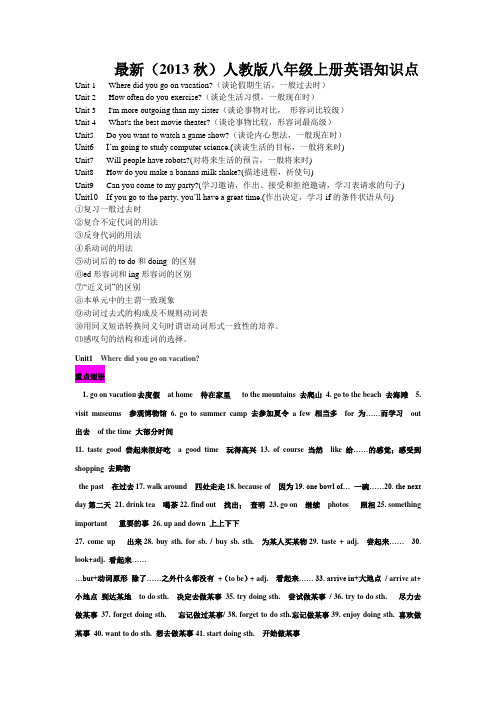
最新(2013秋)人教版八年级上册英语知识点Unit 1 Where did you go on vacation?(谈论假期生活,一般过去时)Unit 2 How often do you exercise?(谈论生活习惯,一般现在时)Unit 3 I'm more outgoing than my sister(谈论事物对比,形容词比较级)Unit 4 What's the best movie theater?(谈论事物比较,形容词最高级)Unit5 Do you want to watch a game show?(谈论内心想法,一般现在时)Unit6 I’m going to study computer science.(谈谈生活的目标,一般将来时)Unit7 Will people have robots?(对将来生活的预言,一般将来时)Unit8 How do you make a banana milk shake?(描述进程,祈使句)Unit9 Can you come to my party?(学习邀请,作出、接受和拒绝邀请,学习表请求的句子) Unit10 If you go to the party, you’ll have a great time.(作出决定,学习if的条件状语从句)①复习一般过去时②复合不定代词的用法③反身代词的用法④系动词的用法⑤动词后的to do和doing 的区别⑥ed形容词和ing形容词的区别⑦“近义词”的区别⑧本单元中的主谓一致现象⑨动词过去式的构成及不规则动词表⑩用同义短语转换同义句时谓语动词形式一致性的培养。
⑾感叹句的结构和连词的选择。
Unit1 Where did you go on vacation?重点短语1. go on vacation去度假at home 待在家里to the mountains 去爬山4. go to the beach 去海滩 5. visit museums 参观博物馆6. go to summer camp 去参加夏令a few 相当多for 为……而学习out 出去of the time 大部分时间11. taste good 尝起来很好吃 a good time 玩得高兴13. of course 当然like 给……的感觉;感受到shopping 去购物the past 在过去17. walk around 四处走走18. because of 因为19. one bowl of… 一碗……20. the next day第二天21. drink tea 喝茶22. find out 找出;查明23. go on 继续photos 照相25. something important 重要的事26. up and down 上上下下27. come up 出来28. buy sth. for sb. / buy sb. sth. 为某人买某物29. taste + adj. 尝起来…… 30. look+adj. 看起来………but+动词原形除了……之外什么都没有+(to be)+ adj. 看起来…… 33. arrive in+大地点/ arrive at+小地点到达某地to do sth. 决定去做某事35. try doing sth. 尝试做某事/ 36. try to do sth. 尽力去做某事37. forget doing sth. 忘记做过某事/ 38. forget to do sth.忘记做某事39. enjoy doing sth. 喜欢做某事40. want to do sth. 想去做某事41. start doing sth. 开始做某事42. stop doing sth. 停止做某事43. have a good time=enjoy oneself=have fun(doing sth.)玩得痛快44. keep doing sth. 继续做某事45. Why not do. sth.? 为什么不做……呢46. so+adj.+that+从句如此……以至于…… 47. tell sb. (not) to do sth. 告诉某人(不要)做某事三、重点句子:1. Where did you go on vacation? 你去哪儿度假的?2. Long time no see. 好久不见。
人教版新目标英语八年级上册各单元知识点梳理汇总

新目标八年级上册英语单元知识点归纳Unit1 Where did you go on vacation? 短语归纳1.go on vacation去度假2.stay at home待在家里3.go to the mountains去爬山4.go to the beach去海滩5.visit museums 参观博物馆6.go to summer camp去参加夏令营7.quite a few相当多8.study for tests为测验而学习9.go out出去10.most of the time大部分时间11.have a good time (doing)=have fun (doing) =enjoy oneself玩得高兴12.of course=sure =certainly当然13.feel like给……的感觉;感受到14.go shopping去购物15.in the past在过去16.walk around四处走走17.because of+名词短语:因为because+句子18. a/one bowl of…一碗……19. the next day第二天20.drink tea喝茶21.find out找出;查明22.go on继续23.take photos照相24.something important重要的事25.up and down上上下下e up出来come out 出版发行27.go out with anyone 跟别人出去28.say about 发表对…看法29.rain hard 雨下得大30.too much+不可数名词太多…too many+可数名词复数太多...much too+形容词太…用法:1.buy sth. for sb. / buy sb. sth.为某人买某物2.taste / look/sound/smell good. 尝起来/看起来/听起来/闻起来不错3.nothing…but+动词原形除了……之外什么都没有4.seem+(to be)+ adj. 看起来……5.arrive in+大地点/ arrive at+小地点/get to +地点/reach +地点到达某地6.decide to do sth.决定去做某事7.try doing sth.尝试做某事/ try to do sth.尽力去做某事8.forget doing sth.忘记做过某事/ forget to do sth.忘记做某事9.enjoy doing sth.喜欢做某事10. want to do sth.想去做某事11.start doing sth.开始做某事12.stop doing sth. 停止做某事13.dislike doing sth. 不喜欢做某事14.keep doing sth.继续做某事keep on doing sth 不停做某事15.Why not do. sth.=why don’t you do sth为什么不做……呢?16.so+adj.+that+从句如此……以至于……17.tell sb. (not) to do sth. 告诉某人(不要)做某事18.enough +名词,形容词+enough19.not really .真的没有。
人教新目标八年级英语上册重难点知识点归纳

PEP八年级英语上册Unit 1 Where did you go on vacation?难点:不定代词anyone, something, anything, everything, nothing 等的用法;反身代词的用法知识点&考点:go on vacation/be on vacation 去度假stay at home 待在家里go out 出去go with 和……一起去……Long time no see. 好久不见。
take photos 照相quite a few 相当多most of time 大部分时间介词to表目的的用法buy sth. for sb. = buy sb. sth. 买……给……taste good 尝起来不错(感官动词+adjective)How do you like it = What do you think of it 你觉得……怎么样?have a good time = have fun = enjoy oneself玩得开心of course 当然nothing … but …除了……之外没有什么(not … but …)The only problem was that …(同位语从句)seem to be/seem + adj. 看起来……keep a diary 记日记+ at + 小地点arrive+ in + 大地点decide to do 决定做某事try doing sth. 尝试做某事 try to do sth. 尽力做某事feel like 感觉到 feel like + n./ v-ing想要……ride … to …骑……到……许多的:a lot of + 可数名词 lots of + 可数or不可数名词I wonder that …我想知道……in the past 在过去enjoy doing sth. 享受做某事walk around 到处逛逛感叹句:What + 冠词 + adj. + n. + (it is) = How + adj. + 冠词 + n. + (it is)start doing sth. 开始做某事 stop doing sth. 停止做某事 finish doing sth. 结束做某事because & so(不可同用)wait for …等待……because of + n.a little/ a few 一些(两者的区别,以及与little/few 的区别)enough + n. / adj. + enoughas + adj./adv. + as 和……一样……one bowl of …一碗……along the way 沿着这条路时间段+ later = after + 时间段……之后other, others, the other, the others, anotheron trip 在旅途中find out 找到,找出 / find 寻找 / look for 寻找so + adj. + that + 从句如此……以致……tell sb. (not) to do sth. 告诉某人(不要)做某事keep doing sth. / go on doing sth. 继续做某事keep sth. + adj. 使……保持……状态up and down (人)来来往往;(物)上上下下in excitement = excitedly 兴奋地come up / come out / come on / come inforget to do sth. 忘记做某事 forget doing sth. 忘记做过某事like / dislike + n. / v-ing喜欢/不喜欢某物/做某事something + adj. ……的事情Why not + v. = Why don’t you + v. 为什么不……呢?Unit 2 How often do you exercise?重点:1. How often 句型的运用;2. 六个频度副词never, hardly ever, sometimes, often, usually, always的差异、理解及使用;3. 频率数词once, twice等的认识和运用;4. 一般现在时不同人称谓语形式的变化及一般疑问句的问答。
新目标八年级英语上Unit 1-5 重点句型总汇
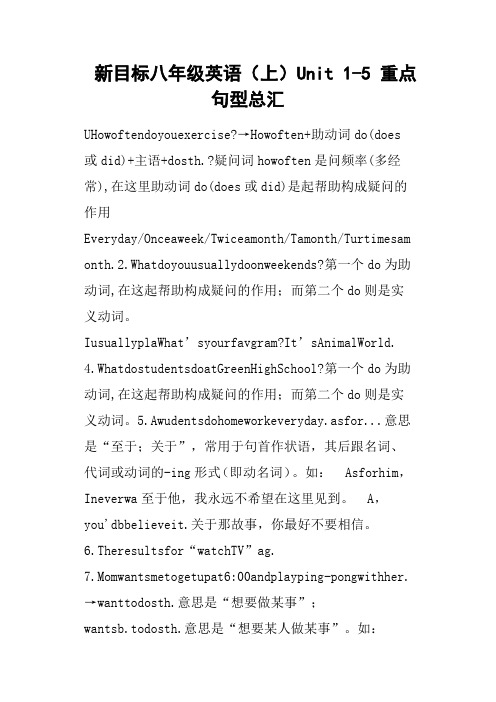
新目标八年级英语(上)Unit 1-5 重点句型总汇UHowoftendoyouexercise?→Howoften+助动词do(does或did)+主语+dosth.?疑问词howoften是问频率(多经常),在这里助动词do(does或did)是起帮助构成疑问的作用Everyday/Onceaweek/Twiceamonth/Tamonth/Turtimesam onth.2.Whatdoyouusuallydoonweekends?第一个do为助动词,在这起帮助构成疑问的作用;而第二个do则是实义动词。
IusuallyplaWhat’syourfavgram?It’sAnimalWorld. 4.WhatdostudentsdoatGreenHighSchool?第一个do为助动词,在这起帮助构成疑问的作用;而第二个do则是实义动词。
5.Awudentsdohomeworkeveryday.asfor...意思是“至于;关于”,常用于句首作状语,其后跟名词、代词或动词的-ing形式(即动名词)。
如:Asforhim,Ineverwa至于他,我永远不希望在这里见到。
A,you'dbbelieveit.关于那故事,你最好不要相信。
6.Theresults for“watchTV”ag.7.Momwantsmetogetupat6:00andplayping-pongwithher.→wanttodosth.意思是“想要做某事”;wantsb.todosth.意思是“想要某人做某事”。
如:Doyouwanttogvieswithme?你想和我一起去看电影吗?Theteacherdoesn'twantustoeathamburgers.老师不想让我们吃汉堡包。
8.Shesaysit’sgoodformyhealth.→begoodfor...表示“对……有益(有好处)”。
其反义为:bebadfor...。
新目标英语八上知识点归纳
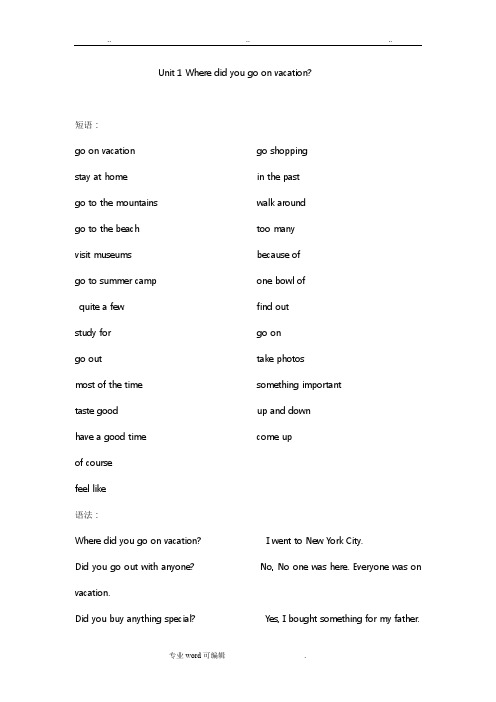
Unit 1 Where did you go on vacation? 短语:go on vacation stay at homego to the mountains go to the beach visit museumsgo to summer camp quite a fewstudy forgo outmost of the time taste goodhave a good time of coursefeel like go shoppingin the pastwalk aroundtoo many because ofone bowl offind outgo ontake photos something important up and down come up语法:Where did you go on vacation? I went to New York City.Did you go out with anyone? No, No one was here. Everyone was on vacation.Did you buy anything special? Yes, I bought something for my father.How was the food? Everything tasted really good. Did everyone have a good time? Oh,yes. Everything was excellent. 惯用法:1. buy sth for ab./ buy sb. sth 为某人买某物2. taste + adj. 尝起来……3. nothing ….but + V.(原形) 除了……之外什么都没有4. seem + (to be) + adj 看起来5. arrive in + 大地方/ arrive at + 小地方到达某地6. decide to do sth. 决定做某事7. try doing sth. 尝试做某事/ try to do sth. 尽力做某事8. enjoy doing sth. 喜欢做某事9. want to do sth. 想去做某事10. start doing sth. 开始做某事11. stop doing sth. 停止做某事12. look + adj 看起来13. dislike doing sth. 不喜欢做某事14. Why not do sth. 为什么不做…….呢?15. so + adj + that + 从句如此……以至于……16. tell sb. (not) to do sth. 告诉某人(不要)做某事17. keep doing sth. 继续做某事18. forget to do sth. 忘记去做某事/ forget doing sth 忘记做过某事词语辨析:1. anywhere 与somewhere 两者都是不定副词。
人教版新目标八年级英语上册各单元重点单词和短语梳理归纳

人教版新目标八年级英语上册各单元重点单词和短语梳理归纳Unit 1 Where did you go on n?In this unit。
we learn some XXX.1.Phrasesgo on n: XXXstay at home: not go XXXgo to the mountains: XXXgo to the beach: XXXvisit museums: go to museums for sightseeinggo to summer camp: XXXquite a few: a considerable numberstudy for: learn for a specific purposego out: leave the house for activitiesmost of the time: the majority of the timetaste good: have a good flavorhave a good time: enjoy oneselfof course: certainlyfeel like: have the feeling ofgo shopping: visit stores for shoppingin the past: before nowwalk around: stroll in an areabecause of: due toXXX: a serving ofthe next day: the following dayXXX: have tea as a XXXfind out: discovergo on: continuetake photos: use a camera to capture images XXXup and down: moving in different ns come up: appear or XXX2.Sentence Structuresbuy sth。
新版新目标英语八年级上册知识点总结

新版新目标英语八年级上册知识点总结Unit7 Will people have robortsSection A1.一般将来时(1)概念: 一般将来时是表示将来某个时间将要发生的动作或存在的状态。
I am going to / shall watch a football match on TV this evening. 今天晚上我将看一场足球比赛。
(2)结构①肯定式:主语 + 助动词will/shall + 动词原形 + 其他(wil用于各种人称,shall用于第一人称)=主语 + be going to + 动词原形 + 其他will表示单纯将来概念,be going to强调事先经过考虑安排而计划或打算要做某事(意图) Are you going to post that letter由某种迹象判断某事有可能发生(预见) It’s going to rain.②否定式:在will/shall/be 后面加 not. will not = won’t③一般疑问句:将will/shall/be 提到主语前面。
be 某地有某物它有不同时态。
(1) 过去时态:There was/ were…. 表某地过去有某物(2) 现在时态:There is/ are …. 表某地现在有某物(3) 将来时态:There will be …= There is/are going to be…表某地将有某物(4)句式①一般疑问句形式:Will there be + 主语 + 其他。
②肯定回答:Yes, there will. 否定回答是:No, there won’t.③否定形式:There won’t be + 主语 + 其他,将不会有……④特殊疑问句: 疑问词/ 词组 + 一般疑问句When will there be a nice match何时会有一场精彩的球赛(6) there be句型中不能用have\has(7) there be 表示某地存在某物强调的是客观存在着的东西。
新目标英语八年级上册1至6单元知识点总结

八年级上册1-6单元知识点总结第一单元一、应掌握的单词:1、exercise既可以做名词,也可以做动词,表示“锻炼,运动”时,是不可数名词,表示“练习,体操”时,是可数名词。
2、skateboard【动词】意为“踩滑板;参加滑板运动”,skate【动词】意为“滑冰;溜冰”,board【名词】意为“板”。
3、hardly=almost not 几乎不几乎不 4、active【形容词】意为“活跃的;积极的”,它的名词形式是activity.5、about=around大约大约 6、of course= sure=certainly当然当然 7、look after=take care of 照顾照顾 8、different【形容词】意为“不同的;有区别的” ,它的名词形式是difference.9、although=though虽然虽然 10、a lot of=lots of后面跟可数名词的复数或不可数名词。
11、must【情态动词】意为“必须”,后面跟动词原形,相当于have to.12、less【形容词】意为“较小的;更小的;较少的;更少的”,它是little的比较级。
的比较级。
二、应掌握的词组:1. go to the movies 去看电影去看电影2. watch TV看电视看电视3. surf the internet 上网上网 ,上网冲浪,上网冲浪 4.read English books读英语书读英语书5.do homework做家庭作业做家庭作业(do housework做家务事)做家务事)6.all students所有的学生100%7.most students大多数学生51-99% (= most of the students)8.some students 一些学生1-50%9.no students没有学生0%10.as for至于至于11. be good for 对什么有益对什么有益(be bad for对什么有害)对什么有害)12. come home from school放学回家放学回家 13. eating habits 饮食习惯饮食习惯饮食习惯14.pretty good非常好,不错非常好,不错15. junk food垃圾食物垃圾食物16. healthy lifestyle 健康的生活方式健康的生活方式健康的生活方式 17.kind of=a little=a little bit有点有点 18. help sb to do sth帮助某人做某事,帮助某人做某事, =help sb with sth 19. go skateboarding 去划板去划板去划板20. keep healthy=stay healthy 保持健康21. exercise=take (much) exercise=do sports锻炼锻炼22. take more exercise 做更多的运动做更多的运动 23. the same as 与什么相同与什么相同24. once a month一月一次一月一次25. be different from 不同不同26. twice a week一周两次一周两次一周两次27. make a difference to 对什么有影响对什么有影响 28. how often 多久一次多久一次多久一次29. shop=go shopping=do some shopping 购物购物30. activity survey活动调查活动调查31. eat less meat吃更少的肉吃更少的肉32. want to do sth 想做某事想做某事33. want sb to do sth想要某人做某事想要某人做某事 34. get good grades取得好成绩取得好成绩取得好成绩35. a lot of vegetables=many vegetables许多蔬菜许多蔬菜36. keep/be in good health保持健康保持健康三、 应掌握的句子:1.How often do you watch TV? 你多久看一次电视?你多久看一次电视?How often + 助动词(助动词(do 或does) + 主语主语 + do sth.?这个句型是用来提问在某一特定这个句型是用来提问在某一特定的时间里进行某个动作的次数,即“多久一次”。
八年级英语上册知识点总结(全)

八年级英语上册知识点总结人教新目标版Unit 1 How often do you exercise?一、词组go to the movies 去看电影look after=take care of 照顾surf the internet 上网healthy lifestyle 健康的生活方式go skate boarding 去划板keep healthy=stay healthy 保持健康eating habits 饮食习惯take more exercise 做更多的运动the same as 与什么相同once a month 一月一次be different from 不同twice a week 一周两次make a difference to 对什么有影响how often 多久一次although=though虽然as for 至于activity survey活动调查do homework做家庭作业do housework做家务事eat less meat 吃更少的肉junk food垃圾食物be good for 对什么有益be bad for对什么有害want to do sth 想做某事want sb to do sth想某人做某事try to do sth 尽量做某事come home from school放学回家of course=certainly=sure 当然get good grades 取得好成绩some advice 一些建议most of the students=most students 大多数学生shop=go shopping=do some shopping 购物exercise=take (much) exercise=do sports 锻炼help sb to do sth=help sb with sth 帮助某人做某事a lot of vegetables=many vegetables 许多蔬菜hardly=not nearly/almost not 几乎不keep/be in good health保持健康二、词汇精讲1、always、usually、often、sometimes、hardly ever和neveralways、usually、often、sometimes、hardly ever和never是英语中最常见的频度副词。
人教新目标英语八年级上册unit1-Unit4单元重点知识复习
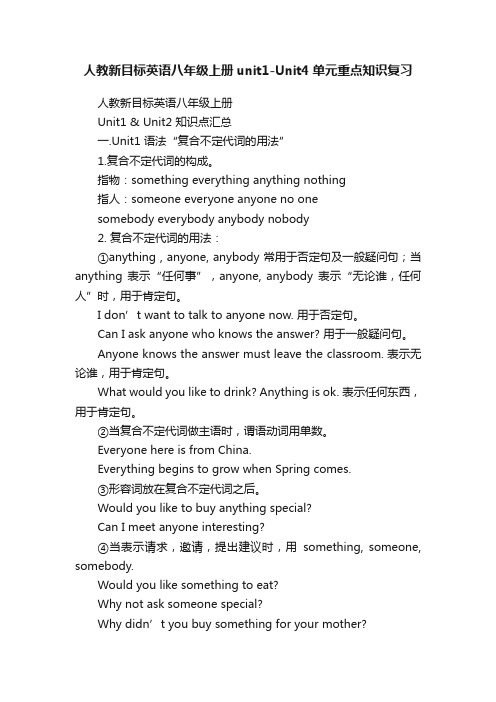
人教新目标英语八年级上册unit1-Unit4单元重点知识复习人教新目标英语八年级上册Unit1 & Unit2 知识点汇总一.Unit1 语法“复合不定代词的用法”1.复合不定代词的构成。
指物:something everything anything nothing指人:someone everyone anyone no onesomebody everybody anybody nobody2. 复合不定代词的用法:①anything , anyone, anybody 常用于否定句及一般疑问句;当anything 表示“任何事”,anyone, anybody 表示“无论谁,任何人”时,用于肯定句。
I don’t want to talk to anyone now. 用于否定句。
Can I ask anyone who knows the answer? 用于一般疑问句。
Anyone knows the answer must leave the classroom. 表示无论谁,用于肯定句。
What would you like to drink? Anything is ok. 表示任何东西,用于肯定句。
②当复合不定代词做主语时,谓语动词用单数。
Everyone here is from China.Everything begins to grow when Spring comes.③形容词放在复合不定代词之后。
Would you like to buy anything special?Can I meet anyone interesting?④当表示请求,邀请,提出建议时,用something, someone, somebody.Would you like something to eat?Why not ask someone special?Why didn’t you buy something for your mother?Unit2 语法“频率副词”How often 常用于对频率的提问,意为“多长时间一次”,其答语可以是once/ twice / three times a week; always/ usually/ often/ sometimes/ hardly ever/ never 等表示时间频率的副词及短语。
初中英语人教新目标八年级上册Unit 2 重要知识点(重点语块+词形变换+重点句子)

八年级英语上册Unit 2重要知识点Section A【重点语块】1.how often多久一次2.go to the movies看电影3.help with housework 帮忙做家务4.go shopping去购物5.hardly ever几乎从不6.once a week每周一次7.three times a week 一周三次8.twice a month一个月两次e the Internet上网10.what kind of什么种类11.swing dance摇摆舞12.stay up late熬夜13.play sports做运动14.at least至少,不少于;起码15.go to bed early早点睡觉16.eat a healthy breakfast 吃健康的早餐17.be full of...充满……18.my favorite program我最喜欢的节目【词形变换】1.hardly adv.几乎不;几乎没有→hard adv.努力地 adj.困难的;艰苦的2.exercise n.锻炼;练习→exercise v.锻炼;运动3.once adv.一次;曾经→one num.(基数词)一;一个→first num.(序数词)第一4.twice adv.两次;两倍→two num.(基数词)二;两个→second num.(序数词)第二5.least adv.& adj.最小(的);最少(的)→ little adv.& adj.小(的);少(的)→less adv.&adj.更小(的);更少(的)6.swing n.摆动;秋千v.(使)摆动;摇摆→swung(过去式)【重点句子】1.—What do you usually do on weekends?I often go to the movies.—你周末通常做什么?—我经常去看电影。
(完整版)八年级英语上册1-4单元知识点总结
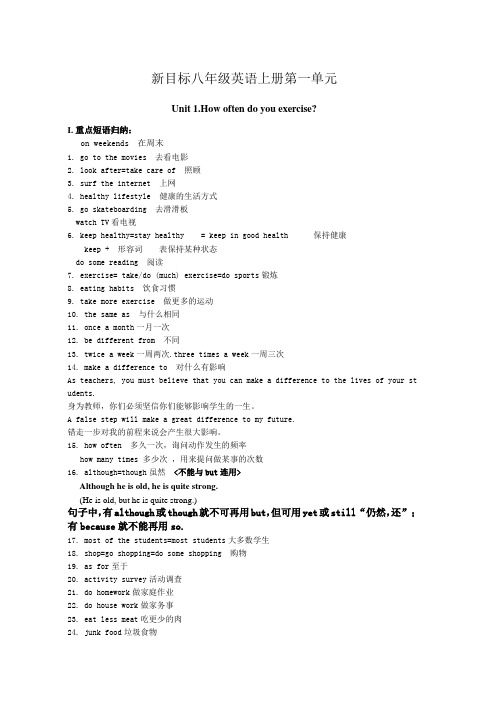
新目标八年级英语上册第一单元Unit 1.How often do you exercise?I. 重点短语归纳:on weekends 在周末1. go to the movies 去看电影2. look after=take care of 照顾3. surf the internet 上网4. healthy lifestyle 健康的生活方式5. go skateboarding 去滑滑板watch TV看电视6. keep healthy=stay healthy = keep in good health 保持健康keep + 形容词表保持某种状态do some reading 阅读7. exercise= take/do (much) exercise=do sports锻炼8. eating habits 饮食习惯9. take more exercise 做更多的运动10. the same as 与什么相同11. once a month一月一次12. be different from 不同13. twice a week一周两次.three times a week一周三次14. make a difference to 对什么有影响As teachers, you must believe that you can make a difference to the lives of your st udents.身为教师,你们必须坚信你们能够影响学生的一生。
A false step will make a great difference to my future.错走一步对我的前程来说会产生很大影响。
15. how often 多久一次,询问动作发生的频率how many times 多少次,用来提问做某事的次数16. although=though虽然<不能与but连用>Although he is old, he is quite strong.(He is old, but he is quite strong.)句子中,有although或though就不可再用but,但可用yet或still“仍然,还”;有because就不能再用so.17. most of the students=most students大多数学生18. shop=go shopping=do some shopping 购物19. as for至于20. activity survey活动调查21. do homework做家庭作业22. do house work做家务事23. eat less meat吃更少的肉24. junk food垃圾食物25. be good for 对什么有益26. be bad for对什么有害27. want to do sth 想做某事28. want sb to do sth想某人做某事29. try to do sth 尽量做某事30. come home from school放学回家31. of course=certainly=sure当然32. get good grades取得好成绩33. some advice 一些建议some advice 中的advice 是不可数名词 a piece of advice 一则建议 give advice 提出建议take one’s advice 采纳或听从某人的建议4. help sb to do sth帮助某人做某事=help sb with sth35. a lot of vegetables=many vegetables许多蔬菜36. hardly= almost not几乎不hardly ever很少,几乎不,从不37. keep/be in good health保持健康38.your favorite program你最喜欢的节目39. Animal World 动物世界40. play soccer踢足球41.every day 每天every day 与everyday1. every day 作状语,译为“每一天”。
初二上册英语 重点短语句型总结(可打印修改)
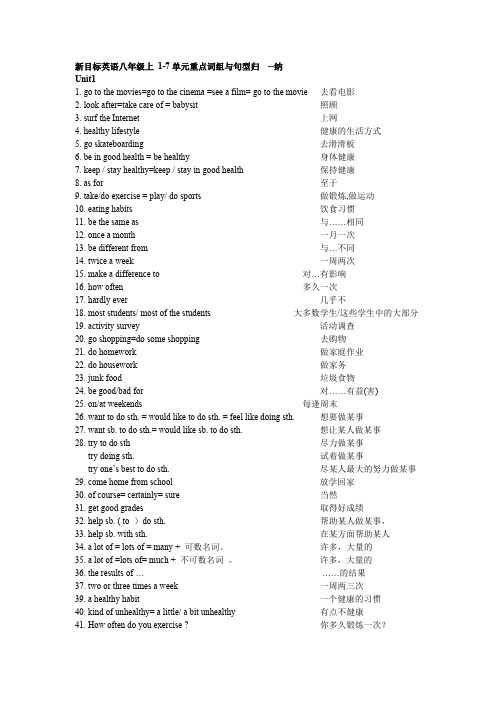
新目标英语八年级上1-7单元重点词组与句型归--纳Unit11. go to the movies=go to the cinema =see a film= go to the movie 去看电影2. look after=take care of = babysit 照顾3. surf the Internet 上网4. healthy lifestyle 健康的生活方式5. go skateboarding 去滑滑板6. be in good health = be healthy 身体健康7. keep / stay healthy=keep / stay in good health 保持健康8. as for 至于9. take/do exercise = play/ do sports 做锻炼,做运动10. eating habits 饮食习惯11. be the same as 与……相同12. once a month一月一次13. be different from 与…不同14. twice a week一周两次15. make a difference to 对…有影响16. how often 多久一次17. hardly ever 几乎不18. most students/ most of the students大多数学生/这些学生中的大部分19. activity survey活动调查20. go shopping=do some shopping 去购物21. do homework做家庭作业22. do housework做家务23. junk food垃圾食物24. be good/bad for 对……有益(害)25. on/at weekends 每逢周末26. want to do sth. = would like to do sth. = feel like doing sth. 想要做某事27. want sb. to do sth.= would like sb. to do sth. 想让某人做某事28. try to do sth 尽力做某事try doing sth.试着做某事try one’s best to do sth.尽某人最大的努力做某事29. come home from school放学回家30. of course= certainly= sure当然31. get good grades取得好成绩32. help sb. ( to )do sth. 帮助某人做某事,33. help sb. with sth. 在某方面帮助某人34. a lot of = lots of = many + 可数名词。
新目标英语八年级(上)重点、考点归纳总结
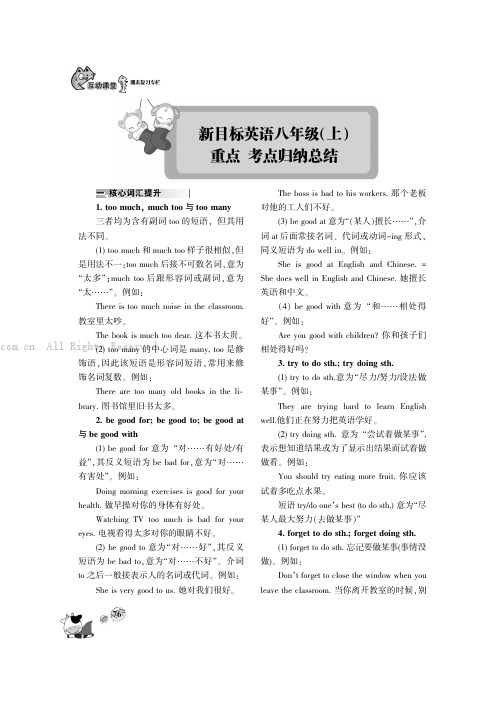
新目标英语八年级(上)重点、考点归纳总结一、核心词汇提升1.too much袁much too与too many三者均为含有副词too的短语,但其用法不同。
(1)too much和much too样子很相似,但是用法不一:too much后接不可数名词,意为“太多”;much too后跟形容词或副词,意为“太……”。
例如:There is too much noise in the classroom.教室里太吵。
The book is much too dear.这本书太贵。
(2)too many的中心词是many,too是修饰语,因此该短语是形容词短语,常用来修饰名词复数。
例如:There are too many old books in the li⁃brary.图书馆里旧书太多。
2.be good for;be good to;be good at 与be good with(1)be good for意为“对……有好处/有益”,其反义短语为be bad for,意为“对……有害处”。
例如:Doing morning exercises is good for your health.做早操对你的身体有好处。
Watching TV too much is bad for your eyes.电视看得太多对你的眼睛不好。
(2)be good to意为“对……好”,其反义短语为be bad to,意为“对……不好”。
介词to之后一般接表示人的名词或代词。
例如: She is very good to us.她对我们很好。
The boss is bad to his workers.那个老板对他的工人们不好。
(3)be good at意为“(某人)擅长……”,介词at后面常接名词、代词或动词-ing形式,同义短语为do well in。
例如:She is good at English and Chinese.= She does well in English and Chinese.她擅长英语和中文。
- 1、下载文档前请自行甄别文档内容的完整性,平台不提供额外的编辑、内容补充、找答案等附加服务。
- 2、"仅部分预览"的文档,不可在线预览部分如存在完整性等问题,可反馈申请退款(可完整预览的文档不适用该条件!)。
- 3、如文档侵犯您的权益,请联系客服反馈,我们会尽快为您处理(人工客服工作时间:9:00-18:30)。
新目标英语八年级(上)重点、考点归纳总结【重点词汇】1. mind(1)n. 心智;头脑;决心例如:A moment of fear went through my mind but I told myself to calm down since I was still alive. (片刻的恐惧掠过我的脑海,但我告诉自己要冷静下来,因为我还活着。
)Several thoughts crossed my mind as I watched him work. (当我看着他干活时我脑海里闪现了几个念头。
)(2)vt. 专心于,愿意做;介意;当心例如:She wouldn’t mind taking care of our children. (她不介意照顾我们的孩子。
)Mind!There is a bus coming!(当心!车来了!)Mind the wet paint. (当心,油漆未干。
)(3)注意:mind作“介意”讲时,常用于疑问句、否定句或条件句中,后面跟动名词作宾语,不跟动词不定式。
例如:Would you mind showing me how to start this online tour?(你能告诉我如何开始这个在线旅游吗?)Never mind. There’s still plenty of time for them to score. (没有关系。
还有很多时间,他们可以得分。
)I’m patient. I don’t mind waiting for people. (我很耐心。
我不介意等人。
)(4)相关短语:make up one’s mind 下决心never mind 不用担心,别管;不要紧,没关系to my mind 依我看,我认为broaden/cultivate/enrich one’s mind 开阔心胸/陶冶情操/丰富思想mind one’s father and mother’s words 记住父母的话mind one’s teacher’s words 记住老师的话mind one’s work 专心于工作mind the baby 照看孩子mind the club 管理俱乐部mind the rules 服从规定mind the store 照料店铺mind the train 当心火车mind your own business 少管闲事mind out 当心,注意change one’s mind 改变主意put sb. in mind of sth. 让某人想起某事2. point(1)作名词①“得分;分数”例如:You get a point every time you answer a question correctly. (每次你正确回答一个问题就会得到一分。
)②“标点”例如:Please mark the sentence with points. (请给这个句子加标点。
)③“点;小数点”例如:The line AB cuts the line CD at the point E. (直线AB与直线CD相交于E点。
)④“地点;尖端”例如:I’ll wait for you at the meeting point in the hall. (我将在大厅的迎接点等你。
)⑤“要点;论点;观点;看法”例如:He missed the whole point of my speech. (他完全没抓住我演讲的重点。
)(2)作动词vt. 用手指等指;(意思上)指向;削尖;加标点于;指路vi. 表明;指向例如:Just point the camera and press the button. (只要把照相机对准,然后按动快门就可以了。
)(3)相关短语:point at 指向;指示point out 指出point to 指向make one’s point (清楚地,有说服力地)阐明观点at all points 在各部分;在各方面;完全地hold the opposite point 持有相反的观点3. decidevt. 决定;解决;裁决vi. 拿定主意;判定(1)接名词或代词例如:It’s important and it’ll decide your fate. (这很重要,将决定你的命运。
)It’s your duty to decide this kind of question. (解决这种问题是你的职责。
)例如:Mrs. Green doesn’t seem/seems not to like the idea. (格林夫人似乎不太喜欢这个主意。
)The young man seemed to have changed much. (这个年轻人看起来变化很大。
)(3)“It seems+that从句”,其中it是形式主语,that 引导主语从句。
例如:It seems that no one knows what has happened in the park. (似乎没有人知道公园里发生了什么事。
)It seems to me that Mr. Brown will not come again. (在我看来布朗先生不会再来了。
)(4)“There+seem to be+名词”,其中to be可省略。
seem的单复数形式要根据后面作主语的名词的单复数形式而定。
例如:There doesn’t seem to be much hope of our beating that team. (看来我们没有多大希望战胜那个队。
)There seems no need to wait longer. (看来没有再等的必要了。
)7. promise(1)作动词v. 允诺;答应例如:Claire had made me promise to tell her the truth. (克莱尔要我保证把真相告诉她。
)常用动词句型为:①promise to do sth. (不定式作宾语)例如:I’m hoping you’ll keep your promise to come for a long visit. (我希望你遵守诺言来这儿多呆几天。
)②promise sb. to do sth. (后接双宾语)例如:He promises me to buy a bike as my birthday gift. (他承诺给我买一辆自行车作为我的生日礼物。
)③promise (sb.)+that从句(that从句为宾语从句)例如:He promises me that he will buy a bike as my birthday gift. (他承诺给我买一辆自行车作为我的生日礼物。
)(2)作名词①允诺;诺言例如:I hope that he will act up to his promise. (我希望他会履行他的诺言。
)②希望;有前途例如:The boy first showed promise as an athlete in grade school. (这个男孩在上小学的时候就初次显示出成为运动员的潜力。
)(3)相关短语:give/make a promise 许诺carry out/keep a promise 遵守诺言break/go back on one’s promise 违背诺言promise sb. to do... 答应某人做……例如:In order to keep the promise,Murphy took Gloria to the nearest shop. (为了遵守诺言,墨菲带着葛洛莉去了最近的商店。
)8. organize(1)v. 组织例如:There are also weekend visits organized to San Francisco and other places of interest in California. (也有组织去旧金山和加利福尼亚及其他名胜古迹的周末旅游。
)Thank you for organizing the class trip. (谢谢你组织这次班级旅行。
)(2)同根词:organized adj. 有条理的;有组织的例如:On the one hand,children need organized activities. (一方面,孩子们需要有组织的活动。
)9. possibleadj. 可能的,有可能做得到的possible表示客观上潜在的可能性,也许实际发生的可能性并不大。
possible一般不用表示人的词作主语,但若真的要用表示人的词作主语,possible后接不定式,这个不定式动作的逻辑宾语应是句子的主语,但此时的possible已经转意为“容易的”。
常用结构有:(1)It is possible (for sb.)to do sth.例如:It is possible for us to get from Beijing to Tianjin in less than an hour. (我们有可能用不到1小时的时间就可从北京到达天津。
)(2)It is possible+that从句。
例如:It is possible that I might be of some use in that part of work. (在做那一部分工作时,我可能帮得上忙。
)(3)相关短语:if possible 可能的话【重点短语】1. feel like(1)表示“摸起来像……”。
例如:It feels like silk. (这东西摸起来像丝绸。
)This feels like an orange. (这东西摸起来像个橙子。
)(2)表示“感觉像(是)……”。
例如:My legs feel like cotton. (我感觉两条腿像棉花一样。
)(3)表示“有……的感觉”。
例如:I’m surprised that he feels like that. (我很惊讶他竟然会有这种感觉。
)(4)表示“给人的感觉(像)是……”。
例如:I was only there two days,but it felt like a week. (我只在那里呆了两天,但好像过了一个星期似的。
)It’s been a year since her daughter died,but to her,it still feels like yesterday. (她女儿已过世一年了,但在她看来,这还仿佛像是在昨天。
